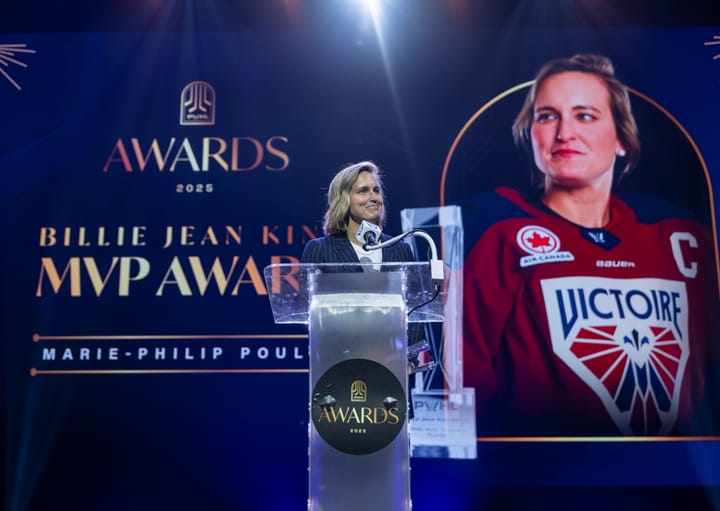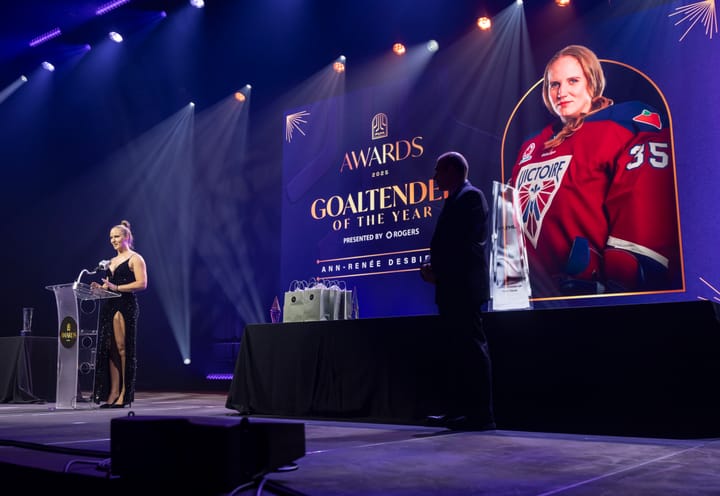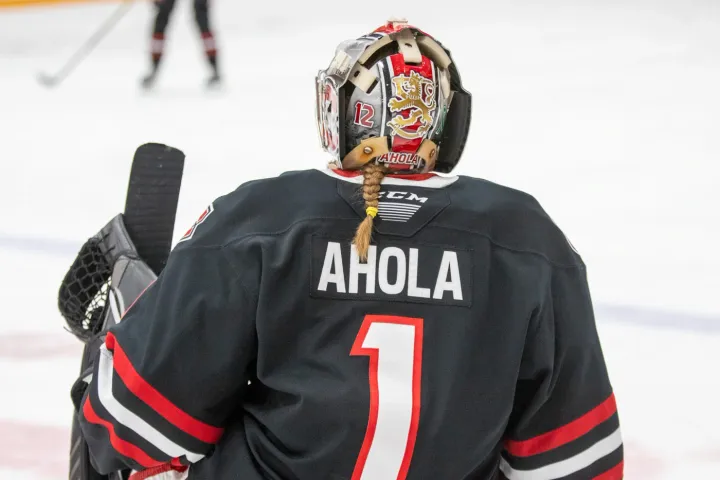Reflecting on Harrison Browne’s Inspiring NWHL career
Don’t cry because it’s over, smile because it happened.
On Aug. 6, 2015 Harrison Browne became a professional hockey player. Browne was one of the first few 100 inaugural NWHL players, a number which includes the rostered and practice players who joined the Boston Pride, Connecticut Whale, New York (now Metropolitan) Riveters, and the Buffalo Beauts.
In the league’s earliest stages, there was an air of trepidatious excitement. Before Browne’s Beauts and the rest of his colleagues established a professional league in the United States, girls had few opportunities to see their heroes — occasionally, they could catch the World Championships, but in most cases, young female hockey players had to wait four years to see women play in the Olympics. Browne was proud to be a part of the solution to that inequity. “Once this league develops, these girls won’t have to wait for the Olympics,” Browne stated. “They can watch myself, or [former Beaut] Erin Zach – they can see women’s hockey consistently.”
Browne’s biggest asset coming into the league was his two-way play. As a forward for the Maine Black Bears, Browne was a +8 at the end of his NCAA career. “Most of my team had minuses,” he said, laughing. “So that’s one of my favorite stats. I always took pride in owning the D-zone, getting in lanes, blocking shots, and getting the puck up the boards.”
Things didn’t change much for Browne in his first season as a pro. There were a lot of inconsistencies in the Beauts’ first season, but one thing was constant throughout: Browne, Devon Skeats, and Kourtney Kunichika would be on a line. That line was designed to seek and destroy.
Kunichika spent the first two Beauts seasons as the neutron that kept swirling electrons Browne and Skeats centered and it paid dividends for the team and head coach Ric Seiling. The trio was a swarming, suffocating machine of three-zone dominance. Few knew what to expect from Skeats, Browne, and Kunichika, and the kinetic physicality of the line was a highlight of the 2015-16 season.
It was Browne and Skeats that would combine for Buffalo’s three goals in Buffalo’s first win as a franchise. It took six games, but the Beauts emerged victorious in a 3-1 decision against the Riveters on Nov. 29, 2015. The game was exactly what the team needed after several up-and-down performances against Boston and Connecticut.
Empty net goal by Hailey Browne. NYR: 1 BUF: 3 pic.twitter.com/tC3w5ZPj5j
— NWHL Gifs (@nwhlgifs) December 2, 2015
After a roller coaster of a season, the Beauts finished in third place in the standings. As a result, Buffalo’s first playoff match-up was the Connecticut Whale. It was the least desirable outcome; Buffalo had failed to defeat Connecticut in six regular season match-ups that year. Things looked dire when the Beauts lost the first game of the three-game series, 3-0. But once again, Browne and Skeats put the team on their backs, potting a goal a piece, with Browne adding an assist to propel Buffalo to its first postseason victory and win over the Whale. Buffalo would repeat its performance the following night, with Browne adding another assist for a total of three points in the series.
After a disappointing loss in the final to Boston, Buffalo didn’t sleep on their measured success and neither did Browne. Again, Harrison was among the first to sign with the Beauts in the offseason and his signing prompted his linemates to come aboard for season two.
Buffalo hosted opening weekend for the season and Browne made history by becoming the first openly transgender professional athlete in American sports. There was a buzz in the air at HarborCenter as Buffalo took the ice against the Boston Pride for a rematch of the Cup final. Boston took a quick 4-0 lead and the familiarity of Pride dominance had quieted the building a bit, but in the third period, with the Beauts shorthanded, Browne’s forecheck caused a turnover and he collected the puck, streaking into the Boston zone.
Just inside the blue line, he split the defense and took a chop on the arm, and after following up on his own rebound, Browne fired the puck home, scoring the Beauts’ first goal of the season. The building went crazy. The internet went crazy. In an unforgettable moment, “What a breakaway goal by Harrison Browne!” I exclaimed on the broadcast and it wasn’t long before the booming voice of Buffalo’s PA technician announced Browne’s name to the crowd. For the first time in his life, Harrison Browne heard his true name credited with a goal.
There were a million questions to be asked after the game. It was difficult to get to Harrison with all of the media surrounding him, but as he walked by, I was able to grab his attention, and asked him about the goal. “I whiffed on the first shot,” he said, smiling. “I was lucky to grab the puck again and put it in.”
The questions continued for coach Seiling. “Nothing’s different,” he told the press. “To me, he’ll always be Brownie.” Harrison would become Brownie for a lot of people. His legend grew throughout the year and so did his popularity, earning him his first trip to the NWHL All-Star game. Browne would score two goals for Team Kessel.
Despite a diminished production, Browne, Skeats, and Kunichika continued to be a key line for Buffalo. Though the team’s roster was in flux, Seiling and the club relied heavily on the line to provide a spark for a team that regularly found itself playing from behind.
On March 19, 2017, the Buffalo Beauts defied all the odds and became the second Isobel Cup champions. Browne, beaming as he hoisted the Cup, became the first transgender athlete to have his name engraved on Isobel’s prize.
It was a bittersweet moment, though. Brownie announced his retirement, making the tough decision to focus on his personal life and advancing his career as an advocate and public speaker. He explains his reasons below in one of his many video journals that have become a bastion of light for people who have faced, or are facing similar struggles.
Retirement didn’t last long from Brownie. On Aug 17, 2017 he announced he’d be playing at least one more season, but this time he’d signed on with the Metropolitan Riveters. Browne moved to the New York City area, where he spent much of his time speaking to youth, at conferences, and even making appearances on national broadcasts, like the Puck Soup podcast.
Related
Harrison Browne talks retirement, his comeback, and advocacy
On the ice, Browne recovered a bit of his swagger. On a new team, with new linemates, a refreshed Browne played a significant role in Metro’s 12-game winning streak to start the 2017-18 season. The Riveters remained in first place for the entirety of the year and took a hard-fought 1-0 victory in the Isobel Cup final in front of a standing-room only crowd on home ice at Barnabas Health Hockey House. Browne lifted Lady Isobel once again, becoming only the second player to have his name emblazoned twice on the trophy.
On April 30, 2018, Browne once again announced he would retire. This time, it would be for good. Again, he expressed his feelings to his fans and the community at-large:
Statistics can’t measure the impact of Browne’s career. In Buffalo’s up-and-down inaugural campaign, Browne and his linemates were the team’s touchstone. In year two, the trio would again be Buffalo’s rock, but more importantly, Browne became a touchstone for a marginalized community of people — a connection for those who may often feel alone. In his third professional season, Browne increased his outreach and utilized his platform to continue to fight for that community.
There is no question that Browne will remain an important figurehead throughout his lifetime. His tenacity defined his playing career and will surely aid him in his future endeavors. His charismatic charm and ease of character made him incredible to work with from a media standpoint and surely that will also serve him in the future.
The league will miss Brownie. The media will miss Brownie. But the community that Harrison Browne helped so diligently to cultivate will not miss Brownie. His video journals and social media presence serve as persistent reminders that we are not alone. That we can overcome. That the incredible strength of the human spirit is what defines us as champions on and off the ice.
Thank you, Harrison Browne.





Comments ()